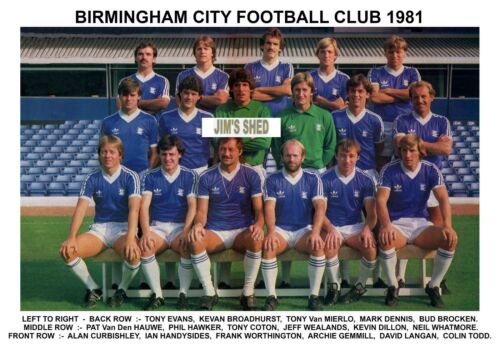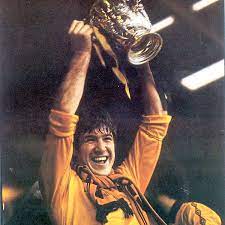20. Feb, 2022
WOLVERHAMPTON WANDERERS: THE GOLDEN GIANT RISES FROM THE DEPTHS
I was watching Soccer Saturday 2 weeks ago, the panel were discussing the woes of Manchester United, half way through the debate Kris Boyd added "Look at clubs like Wolves, what they have achieved."
I doubt Mr Boyd will receive many Christmas Cards from the Black Country next festive season. Well unless they are from West Bromwich Albion Fans. You see football did actually exist before The Premier League.
In those primitive days Wolverhampton Wanderers were rather good at association football. Between 1949 and 1960 the Molineux Men were Champions of England 3 times and won the FA Cup twice. Managed by the fearsome Stan Cullis, Wolves were also pioneers. They played a series of high profile floodlight friendly matches. The opposition came from top European teams, you could say these games were the forerunner of the European Cup. In 1954 Wolves beat Hungarian side Honved 3-2 at Molineux. Honved included 6 of the Hungary team that had beaten England 6-3. a year earlier. Becoming the first Continental team to win at Wembley. Wearing that iconic stripe of gold shirts, black shorts and gold socks, Wolves had restored national pride.
Billy Wright played in both games, captaining Wolves and England. To pardon the pun, William Ambrose Wright was the original golden boy of English Football. The first footballer to win 100 international caps. and married to a famous singer. In 1958 Wright tied the knot with Joy Beverley, one third of The Beverley Sisters singing trio. There are obvious comparisons with David Beckham. But unlike Becks, Billy Wright shunned publicity. A true gentleman, Wright was never booked during a 20 year career. But above all Wright was a brilliant defender, the Hungary game was a rare blemish. The most famous player in the clubs history, Wright has a statue and a Molineux stand named after him
The boy with gold hair led out a golden team. Peerless goalkeeper Bert Williams and wing wizards Jimmy Mullen and Johnny Hancocks headed a stellar supporting cast. Fast forward 20 years and sorry Kris, Wolves were still pretty useful. They won the League Cup in 1974. New heroes had emerged, Kenny Hibbitt in midfield and Dave Wagstaffe on the wing. Waggy was in his element crossing balls that were thundered into the net by Derek Dougan and John Richards. The Doog and King John terrorised First Division defences as the South Bank rocked along to Slade. Fronted by Noddy Holder, the Wolverhampton based glam rock band dominated the British charts in the early 70s. CUM WATCH THE WOLVES, MI BABIES.
In 1977 Wolves and Slade were in decline. Wolverhampton Wanderers were relegated to the Second Division and Noddy flopped in America. A year later the Molineux Men came roaring back, winning the Second Division Championship. John Barnwell took over as manager. The former Peterborough boss did not hang around. In 1979 he signed striker Andy Gray from local rivals Aston Villa. Wolves paying a club record £1.49 Million to secure his services. It did not stop there as former England captain Emlyn Hughes arrived from Liverpool.
The Investment appeared to be paying off when Wolves finished 6th in 1980, they also won the League Cup again. Wanderers beat Nottingham Forest 1-0 at Wembley. Gray scored the winner as he capitalised on a horrendous mix up in the Forest defence. Emlyn Hughes lifted the trophy (pictured above), thus completing a full set of medals for the defender. The League Cup was the one trophy that alluded Hughes at Anfield. As the cup was hoisted skywards, great ITV commentator Brian Moore declared "WOLVES ARE BACK IN BUSINESS".
Sadly, the opposite transpired as dark clouds loomed over the Black Country. Barnwell was injured in a traffic accident in 1981. Meanwhile Hughes, Hibbitt and Richards were in the twilight of their careers while Gray became injury prone. The 1982 relegation was not a big surprise. John Barnwell was sacked as a returning hero lifted spirits. Derek Dougan became Chief executive as the Bhatti Brothers bought the club. Initially the new regime were hailed as saviors. At one stage Wolverhampton Wanderers were minutes from going out of business. The club incurred massive debts following the building of the John Ireland Stand in 1979. The impressive structure cost a whopping £3 Million to build. To make matters worse the new stand was too far from the ;pitch. Wolves fans must have felt they were watching their favourites from The Hawthorns. The expensive editions of Gray and Hughes piled on the pressure.
The Doog revelled in his messiah role, he even stood on the South Bank during the first home game of the 1982-83 season. Wolves again bounced back to the top flight, finishing runners up to QPR. New manager Graham Hawkins had done a fine job, but the yo-yo effect soon returned as Wolves finished bottom of the First Division in 1984. There was the odd bright spot as Hawkins team won 1-0 at Anfield, Three months earlier Wolves won a Black Country derby. West Bromwich Albion were beaten 3-1 at The Hawthorns. But that was as good as it got.
Unlike 78 and 83 there was no immediate return, in fact Wolves descent would do justice to an Olympic downhill skier. By 1986 they were in the Fourth Division. Big name managers Ian Greaves, Tommy Docherty and 1974 League Cup winning manager Bill McGarry failed to halt the decline. The dramatic fall of grace must have been particularly painful for the returning McGarry.
The Bhatti's were now public enemy number one. The Saudi businessmen had not the financial muscle to recruit good players. Attendances slumped to 4,000 and most of Molineux resembled a bomb site . Green shoots of recovery slowly emerged, local building company Gallagher brought the club in 1986, they appointed Graham Turner as manager. Yet more misery lay ahead. None League Chorley beat Wolves 3-0 in the FA Cup First round. Then in August 1987 Wolves travelled to Scarborough for the first match of the season. It was a historic game for the home side, their first match in the Football League. Before the game a group of Wolves fans climbed on to a stand roof. Amongst them was Andrew Charlesworth who fell 30 feet on to the terracing. Mr Charlesworth was badly injured and was partially paralysed. The tragic incident seemed to some up the decline of a great club.
At the end of that season Wolves lost to Aldershot in the Fourth Division play offs. Sitting in a closed Molinuex stand, Turner was furious as the final whistle blew. The irate boss slammed the door on exiting, you feared that the whole structure would collapse. But he had now need to worry, by then he had one Steve Bull in his ranks. Bully signed shortly after the Chorley fiasco Wolves signed the striker and full back Andy Thompson from arch rivals West Bromwich Albion, has there ever been a better £65,000 spent in British Football. Thompson was a fine servant while Bull went on to score an incredible 306 goals for the Old Gold.
After scoring 19 goals in his first season. Bull scored 52 goals in all competitions as Wanderers won the Fourth Division title in 1988. A year later Wolves won the Third Division Championship, this time Bully scored a mere 50. In June 1989 Bull won his first England cap against Scotland, becoming the first Third Division player in 13 years to be capped by the Three Lions. Steve Bull marked the occasion in typical style, scoring the second goal in England's 2-0 win. He went on to win 13 caps, scoring 5 goals.
Sadly he never played in the Premier League, it took until 2003 for Wolves to reach the promised land. Four years after Bull had hung up his boots. Bully must have been a proud man when Wolverhampton Wanderers finally returned to the big time. In 1999 Bull was awarded the MBE for his services to football..
Sir Jack Hayward was also delighted. The multi millionaire brought Wolves for £2.1 Million in 1990. He had attempted to buy the club in 1982 but lost out to the ill fated Bhatti Brothers consortium.
Sir Jack invested heavily, Molineux was transformed from a run down shack to the splendid stadium you see today. He invited Billy Wright back on to the Wolves board of directors, where he joined former England's Women Cricket captain and Wolves fan Rachel Heyhoe-Flint.
Graham Turner resigned in 1994, despite been well backed in the transfer market he was unable to take the final step, promotion to the top flight of English football. However, his massive contribution should never be overlooked.
The trio of Sir Jack Hayward, Graham Turner and Steve Bull put Wanderers back on the map.. All three were rooted in the old gold. Hayward was born in Whitmore Reans only a quarter of a mile from Molineux. Steve Bull comes from nearby Tipton while Turner is native of Ellesmere Port. The Cheshire town was also the birthplace of Stan Cullis. The sleeping giants revival was written in the stars.

